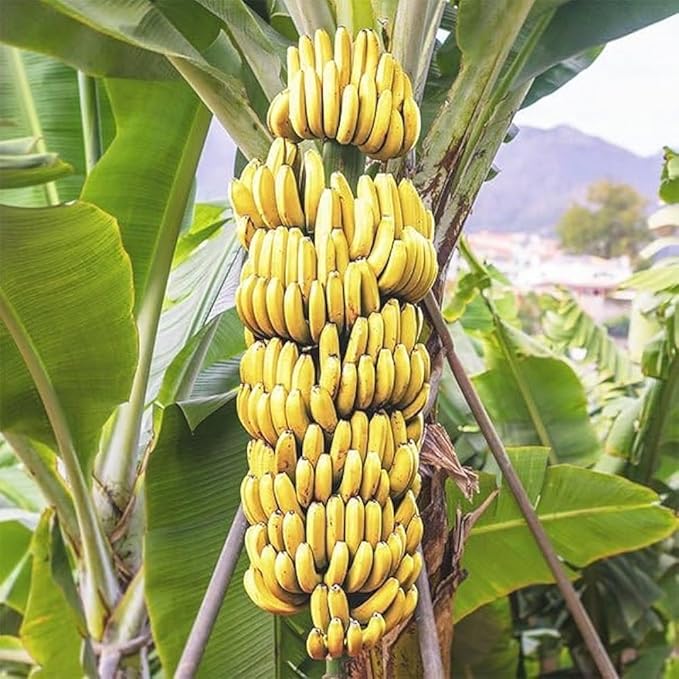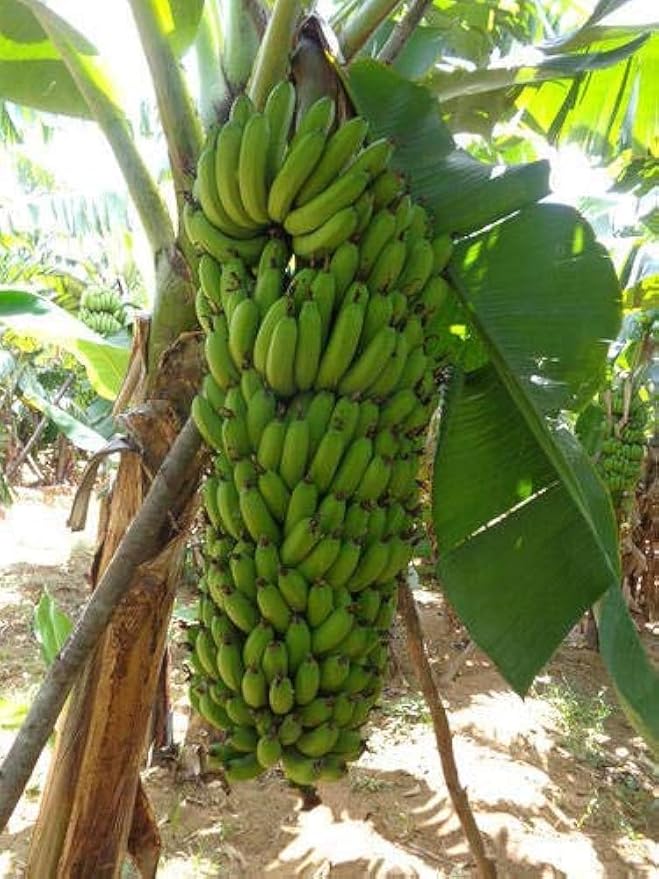
Nutritional Profile of Bananas
A medium-sized banana (about 118–125 g) provides roughly:
-
Calories: ~105–112 kcal
-
Carbohydrates: ~26–29 g
-
Fiber: ~3 g (≈ 11% of daily value)
-
Protein: ~1–1.3 g
-
Fat: Very little (≈ 0.3–0.4 g)
In addition to macronutrients, bananas are rich sources of:
| Nutrient | Approximate % DV (in a medium banana) | Role / Benefit |
|---|---|---|
| Potassium | ~9–10% | Vital for blood pressure regulation, muscle & nerve function |
| Vitamin B6 | ~25–33% | Helps metabolism, neurotransmitter synthesis, immune function |
| Vitamin C | ~10–12% | Antioxidant, supports immunity, skin health |
| Magnesium | ~8% | Supports muscles, nerve function, bone health |
| Manganese, Copper, other micronutrients | Small but meaningful amounts | Cofactors in enzyme systems, antioxidant defense |
Beyond vitamins and minerals, bananas contain fiber, including pectin and resistant starch, and a range of antioxidants / phytonutrients such as dopamine, catechins, etc.
Top Health Benefits of Eating Bananas
Here are the major scientifically supported benefits of bananas:
1. Support Heart Health & Control Blood Pressure
Because bananas are rich in potassium and low in sodium, they help maintain fluid balance and relax blood vessels. This contributes to healthy blood pressure levels.
Higher potassium intake is linked to lower risk of stroke and reduced strain on the cardiovascular system.
2. Aid Digestion & Gut Health
Bananas contain both soluble fiber and resistant starch:
-
Resistant starch (especially in greener bananas) acts as a prebiotic, feeding beneficial gut bacteria.
-
Pectin helps regulate bowel movement, soften stools, and may help prevent constipation.
-
These fibers slow digestion, which moderates blood sugar spikes.
3. Moderate Blood Sugar & Improve Insulin Sensitivity
Bananas have a relatively low to moderate glycemic index (GI approximately 42–51, rising with ripeness) Because of fiber and resistant starch, bananas help slow absorption of sugars, which may aid blood sugar control in many people.
Some studies suggest that resistant starch from bananas may improve insulin sensitivity.
However, in those with diabetes, portion size matters — overly ripe bananas are more sugary and may cause sharper peaks.
4. Help in Weight Management
Thanks to fiber and resistant starch, bananas can promote satiety (feeling full) and reduce overall calorie intake.
By lowering hunger pangs and moderating blood sugar, bananas can be part of a weight‑friendly diet.
5. Boost Energy Quickly
Being carbohydrate-rich, bananas provide a quick, natural source of energy. That’s why many people eat bananas before or during physical activity.
They also help replenish electrolytes (potassium, magnesium) lost through sweat.
6. Mood, Brain & Nerve Health
Bananas contain tryptophan, an amino acid converted into serotonin in the body, which supports mood regulation.
Vitamin B6 in bananas is crucial for neurotransmitter synthesis and brain function.
Also, some phytonutrients in bananas (e.g. antioxidants) may have neuroprotective effects.
7. Support Kidney Function & Prevent Kidney Stones
Potassium helps the kidneys excrete excess sodium, reducing fluid retention and stress on kidneys.
A higher potassium diet is associated with lower risk of kidney stones in healthy individuals.
8. Potential Anti-Cancer & Antioxidant Effects
Bananas contain antioxidants and bioactive compounds like dopamine, catechins, flavonoids, which combat oxidative stress and inflammation.
Some early studies (in vitro / animal) suggest protective roles of banana compounds against certain cancers, but more human research is needed.

Qualities & Characteristics of Bananas
To appreciate bananas more fully, here are some of their standout qualities:
-
Universal & versatile: Eaten raw, mashed, in smoothies, baked goods, banana chips, etc.
-
Easy to digest when ripe: gentle on the stomach, good for people recovering from illness.
-
Long shelf life (in peel): the peel protects the flesh until ready to eat.
-
Ripening changes: green bananas have more resistant starch; as they ripen, starch converts into sugars.
-
Natural browning enzyme: when peeled or cut, banana flesh oxidizes (turns brown) if left exposed to air.
-
Low allergenicity in most people, though some may have sensitivities.
How to Include Bananas in Your Diet
Here are practical and tasty ways:
-
Snack alone — the easiest option.
-
Add to oatmeal, cereal, or yogurt.
-
Blend into smoothies (with caution: overripe bananas spike sugar).
-
Bake banana bread, muffins, pancakes.
-
Freeze slices and use as “ice cream” or in smoothies.
-
Mash bananas and use as a natural sweetener or substitute for fats in baking.
Things to Watch Out / Precautions
While bananas are healthy for most people, there are a few caveats:
-
Too much potassium can be harmful for people with kidney disease or those on potassium‑sparing medications (hyperkalemia risk).
-
Blood sugar concerns: Overripe bananas are higher in sugars, so diabetic individuals should monitor portion size.
-
Digestive discomfort: Eating many bananas may cause bloating or gas in some people due to fiber.
-
Allergic reactions: Rare, but some people (especially with latex allergy) may react to banana proteins.
-
Dental issues: Sugars and starch can cling to teeth; rinse or brush after.
-
Too many bananas = excess calories: As with any food, balance is key.
Sample SEO Structure Recap & Optimization Tips
To make this article indexable and SEO‑friendly, here’s a suggested structure and tips:
-
Title / H1: “Health Benefits of Bananas: Nutrition, Uses & Risks”
-
Meta description (under ~160 chars): “Discover the many health benefits of bananas: from heart health and digestion to energy and mood. Learn nutrition, uses and precautions.”
-
Headings (H2 / H3): use keywords like banana benefits, banana nutrition, banana for digestion, banana risks, etc.
-
Internal & external links: Link to related articles (e.g. about potassium, fiber, diabetes).
-
Use images & alt text: e.g. “banana fruit on table” with alt text “banana nutrition benefits.”
-
Keyword density: use “banana benefits”, “health benefits of banana”, “banana nutrition” naturally (but don’t overstuff).
-
Tags / categories: “Health”, “Nutrition”, “Fruits”, “Wellness”
-
Schema / structured data: If possible, include “FAQ” schema with common questions like “Are bananas good for digestion?” or “How many bananas per day?”
Conclusion
Bananas are much more than a sweet snack. They pack an impressive mix of energy, essential vitamins & minerals, fiber, and bioactive compounds that support digestion, heart health, mood, and beyond. While nearly everyone can enjoy bananas safely, people with kidney issues or blood sugar concerns should be cautious.

You must be logged in to post a comment.